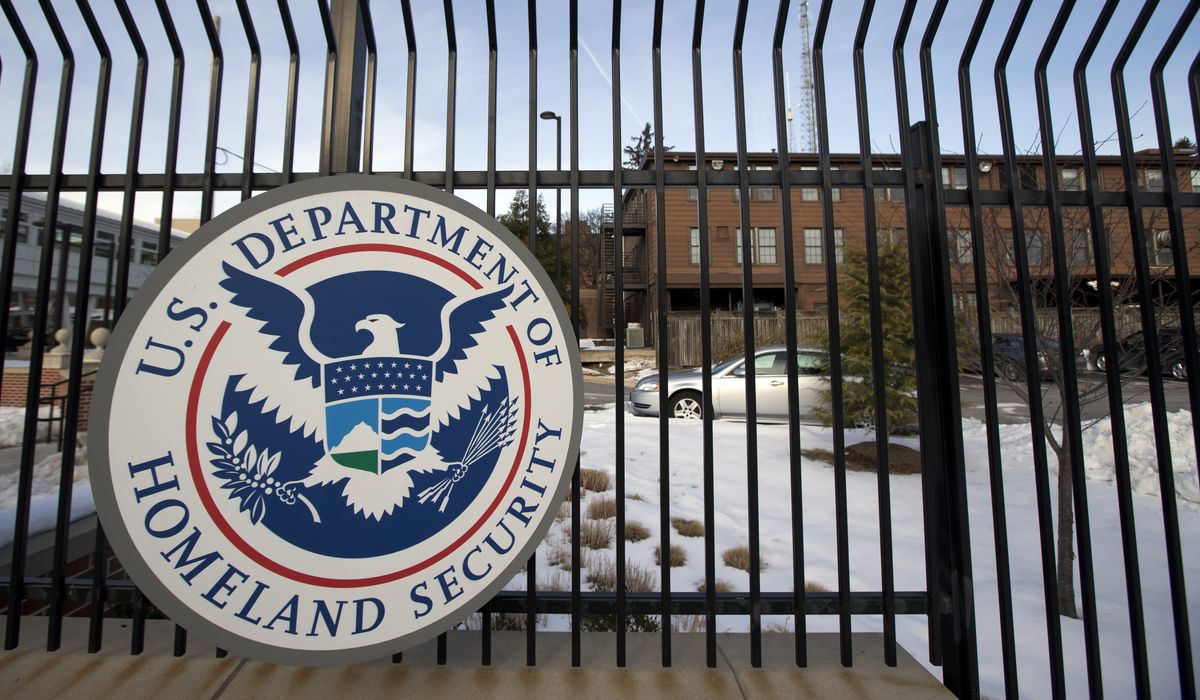
The case of a Homeland Security immigration officer accused of lying about his own immigration history is getting even more sordid with the revelation in court documents that his wife also works for the department — as part of an anti-fraud unit.
Investigators said the woman, identified in court documents only by initials “O.I.”, knew about her husband Karl Ifemembi’s fraud and helped conceal it from U.S. Citizenship and Immigration Services, the legal immigration agency for which they both worked.
Court documents suggest she may even have helped her husband apply for jobs based on which identity story he wanted to use at the time.
The agency wouldn’t reveal to The Washington Times whether she is still employed or what her current duties are.
Sen. Charles E. Grassley of Iowa, the ranking Republican on the Senate Judiciary Committee, last week demanded answers about the case, including whether any other agency employees were aware Mr. Ifemembi was working under a fraudulent identity.
He also wondered whether the agency was reviewing Mr. Ifemembi’s work on immigration applications, and taking steps to fight any taint that might have occurred because of his history,
“This case is particularly concerning given the fact that, in addition to being able to remain in the United States under false pretenses for over 20 years, Mr. Ifemembi was actually hired and employed by USCIS as an immigration services officer for seven years — the very agency that is tasked with administering the nation’s lawful immigration system and ‘safeguarding its integrity and promise,’” the Iowa senator said.
USCIS said it responds to official inquiries through official channels.
Asked about the wife’s role at FDNA, spokesperson Joe Sowers didn’t comment on her status or current duties, instead saying: “USCIS is fully cooperating with authorities. We hold our employees to the highest standards of conduct.”
Investigators said Mr. Ifemembi arrived in the U.S. in 2000 using a bogus British passport, with someone else’s name and information but his own photo. He was flagged by immigration officers in Chicago, and he claimed he was born in Sierra Leone but had to flee because his mother and bother had been killed, and he was seeking asylum.
Two moths later he was granted asylum, and lived under a bogus identity.
Mr. Ifemembi applied for citizenship and a name change in 2010, was granted it in 2011, and then was hired by USCIS — the citizenship agency he’d defrauded — in 2013, all under President Obama.
The agency’s director during that time was Alejandro Mayorkas, whom President Biden has now installed as secretary of the full Homeland Security Department, which oversees USCIS.
Rob Law, who was chief of policy and strategy at USCIS in the latter part of the Trump years, said the incident exposes a flaw in the agency under some leaders who push the view that its customers are people applying for immigration approvals, rather than the American people for whom the immigration system is supposed to work.
He called the situation “incredibly serious” and said it undermines faith in the legal immigration system.
“Until the agency is forthcoming and transparent about the nature of the work that both of them did, and a thorough review of everything they were involved with happens, I think it puts the entire legal immigration system into a universe of disbelief that this could occur,” said Mr. Law, who is now director of regulatory affairs and policy at the Center for Immigration Studies.
In an affidavit filed in the court case, Inspector General Special Agent Carlos A. Feliciano detailed the extensive investigation that unraveled Mr. Ifemembi’s story, including messages he and his wife exchanged making clear she was aware of his fraud.
Indeed, even her parents seemed aware he was “using a fake name,” and her mother thought he “may end up having some immigration problems because she thinks you came in a shady way,” one message read.
Investigators began to unravel the story in 2018 and 2019, interviewing Mr. Ifemembi’s half-brother, who became a U.S. citizen in 1993. Agents say he tried to bring Mr. Ifemembi to the U.S. in 1998 using a false age seven years younger so he could qualify under family migration.
Diplomatic Security Service officers visited Mr. Ifemembi’s family in Nigeria, his real country of birth, and Sierra Leone, where they found no records matching the story he had told of his birth. Agents also searched Mr. Ifemembi’s home and found plenty of documents showing his real identity and contradicting the story he used to gain citizenship — and government employment.
The criminal case against Mr. Ifemembi for unlawful naturalization was brought last month. It’s not clear why there was a delay of more than two years between the February 2019 search of his home and the filing of charges.
Mr. Grassley, in his letter, asked the agency to disclose what triggered the review into Mr. Ifemembi.
Joseph Edlow, who served as acting director of the agency in the latter part of the Trump administration, said once the inspector general’s investigation and any other internal review is done, USCIS must take action.
“While the majority of employees are there to uphold the law and do the right thing there are a handful of people that need to be reminded they do have an obligation to the country,” he said.
Don Crocetti, who helped create FDNS, said he wasn’t familiar with the case but said it sounded like many other fraud cases.
He said no agency or any other organization is immune to unethical employees, though it’s still rare.
“While I believe the government could and should do a much better job with its background investigations, especially of prospective and current employees with foreign links and associations, I don’t believe the number of rotten apples have been any where near significant enough to ‘spoil the barrel,’” he told The Times.
